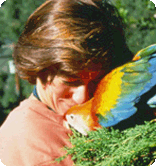Concerns about emotional health of parrot while vacationing

Hello Phoebe,
Three years ago my wife and I adopted a 13 yr old yellow-headed amazon. The bird was originally wild-caught. His first owner had died, and his children sold his two (bonded) parrots to a store,which sold them separately. His partner was already gone when we found our Bobo. In spite of all that he has been through he has become a happy & healthy member of our family. We have no other birds. He is bonded to me but tolerates my wife as a caregiver & playmate. Because of all he has been through-(most of which we'll never know, for instance, he has a big scar on his face)-we have been hesitant to go on vacation. If we drop him at a board-and-care facility he'll probably think he's been abandoned again. Do you have any suggestions for how we might someday handle this? I have one other minor concern: sometimes he eats his poop; Is this a sign of some sort of nutritional deficiency? I would very much appreciate any help you could give me.
Thanks, Joel

Hi Joel,
Thanks for writing to the World Parrot Trust about your mature Amazon, Bobo. It's a great story of a parrot losing his home, then finding one with you!
The last bit you write, about him eating his feces, is a red flag for me and I want to encourage you to have him thoroughly checked out by an avian veterinarian as soon as you can. The vet can run tests for bacteria and advise you about nutrition. Given his history, I think a full blood panel plus protein electrophoresis would be prudent, or as your vet advises.
If it turns out Bobo is perfectly healthy, by the end of the tests, you'll have a good normal panel against which to compare any future examinations. So, get him in for a check-up!
Getting to know your avian vet is also a great way to get to know qualified parrot pet sitters in your area.
Chances are, someone at your avian vet's office will either be a parrot sitter or can recommend one. Or perhaps the veterinarian's office also includes a boarding facility which is usually a last resort in my book (mainly because my parrots are accustomed to being together as a large flock), but could be good if Bobo is particularly comfortable around other birds. While he's at the vet, watch how he reacts to other parrots. Amazons are usually forthright about their feelings, so he'll let you know. If he seems nervous, agitated or aggressive when he sees other birds, you'll know right away that an in-home sitter is best for him.
Together, you'll decide which is best for Bobo: if you decide with an in-home sitter, find someone who will visit your home in advance and get to know you and Bobo and Bobo's routine. Then you'll feel more comfortable going on vacation.
Considering all that he's been through and his relative ease now, he'll most likely be OK with an absence, especially if the parrot sitter resembles you, he likes the sitter and Bobo's routine stays pretty much the way he likes it. You might also consider finding a parrot sitter who will come to your home twice a day, or even two sitters, one for morning and one for evening, depending on what would feel normal to Bobo. Some sitters even like to house-sit (my favorite kind!) and can be depended upon to bring in mail, water plants and generally look after the house.
All that said, sometimes the best parrot sitters are people with no parrot experience but an eager open mind who Bobo likes and who will listen to you and do everything you say. So, if you know someone who is an "animal person" who's open to learning about Bobo, and who Bobo likes, try them out for a short time (perhaps an over-night visit at first) and see how it goes.
Because Amazons are super smart, tell him in advance that you'll be going away, and reassure him that you'll be coming home. Starting now, when you go out -- like to the grocery store or dinner or whatever -- establish a bye-bye and a hello routine. Use it consistently, so he gets accustomed to your leaving for various lengths of time, but always returning. A simple heartfelt greeting upon return usually suffices.
The parrots at my house know how to count, so together we count out the number of days I'll be gone -- I even point it out on a calendar -- and they watch intently. Even if they don't actually count the days I'm gone, the exercise makes me feel better. Plus, we've never had anyone be mad at us when we return. Oh yes, and they love our bird sitters, too, mainly because the birds sitters love them.
Another thing to help your sitter is to be sure s/he knows Bobo's favorite treats and has ample supply of them. Favorite foods, toys and lots of chewing materials: everything that brings trills of joy to Bobo should be provided for him during your absence.
The best strategy for getting him ready for your vacation is to keep up the good work of making him feel valued and secure in your home. Now that he's been with you 3 years, he has a pretty good idea of your constancy and dependability, so you've laid a solid foundation.
If circumstances force you to use a board-and-care facility, be sure your thoroughly check it out in advance. Ask around -- sometimes dog and cat places know about good parrot places. Ask if the parrots who board there are vet checked and avoid those places that take in un-checked birds. Visit unexpectedly, in the morning during feeding and cleaning time, for example. Make an appointment to see the back rooms and where the parrots sleep, not just the public areas. Avoid holidays and long weekends when lots of people travel.
Again, thanks for giving Bobo a good home, thanks for supporting the World Parrot Trust, and have a great time on your vacation!
All best,
Phoebe Linden
Santa Barbara CA

































